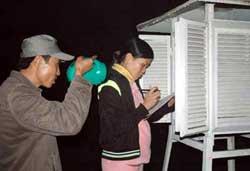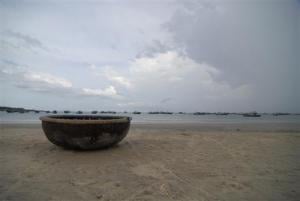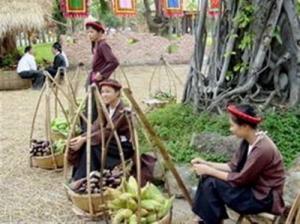Vietnamese women devote lives to weather station

Located at a height of nearly 1,850 metres, Sa Pa meteorological station in the northern province of Lao Cai is not a popular destination.
Different from the hectic atmosphere of main town, the station is quiet and isolated. For many years, however, it has been the sweet home of three women who have devoted their youths doing work that to some, may sound simple: collecting data on wind, rain and sunshine.
The road to the weather station is not as savage and tortuous as it used to be but to many people, the steep concrete road is still a big challenge.
Walking up the slope, people will see an abandoned house. Next to this house is the Sa Pa weather forecast station, work place and home to the only the three women.
This is meteorological station in the country only with female employees.
The eldest woman is called Le Thi Lien. She has worked at the station for more than 20 years. Meanwhile, the youngest whose name is To Thi Hoi has also devoted much of her youth to the station and is now 20. Inbetween the two, Dao Thanh Nga makes up the third member of the team.
Their work sounds simple. Everyday, they have to collect data about the weather from machines and then send it to the Viet Bac hydro-meteorological forecasting station.
However, only by living with them for a whole day can we recognise how hard their work is.
Every day they have to check the data four times: 1am, 7am, 1pm and 7pm come rain or shine, night or day, summer or winter. The checking time has to be absolutely exact in accordance with regulations set by the international hydro-meteorological forecasting sector.
If there is a mistake, it could kill hundreds of people. They only have a short space of time to carry out their work. For example, to gather information about the sun, they have only 30 seconds. If they take longer, the data will be inaccurate.
In total they have 15 minutes to collate the information and send it on to the Viet Bac hydro-meteorological forecasting station. If they are late by only a minute, they will be punished.
The hydro-meteorological forecasting sector may be one of the strictest. And operates a ‘three strikes and you’re out’ policy. The first time they miss their deadline, they will be warned. The second time, they will be punished and if they fail a third time, they will be fired.
Surprisingly for their jobs, the one thing that scares them the most is the weather.
"Although we’ve worked in the sector for a long time the thing that we are afraid of most is the weather, especially when it snows in the winter," said Lien.
Every night, they have to walk through the dark yard to retrieve data from the machines, even in the freezing winter.
Sometimes, the wind is strong enough to bring down a lamp-post, but they still have to go out. The beam of their flashlight is the only light in the yard so it is not uncommon for them to fall at night.
Unforgettable memories
During their time working at the station, these three women have collected many memories that they will never forget.
The story that they all agree is the most interesting, belongs to Hoi.
One night, her shift fell on Tet (Lunar New Year) Festival. Everybody had gone home and she had to stay at the station alone.
It was about 2 degrees below zero. However, as usual, she went out to the yard to take readings, she recalled.
Suddenly, she saw two small blue lights. Her body immediately froze. She wanted to run but she could not, she said, adding that as she was about to faint, the two lights flew away and she recognised that they were the eyes of an owl.
Lien’s story is also a strange one. She was one of the few people to refuse a promotion.
At the end of 90s she was promoted to head of the station. She cried and refused as she would not have been able to take care of her family.
Nga volunteered to go to Sapa meteorological station right after graduating from university. However, after one month all she could do was she cry all day because she felt homesick.
Sometimes, I felt like the world had forgotten me, she said.
To overcome the challenge, she walked 2km every day to town.
"I did not know anyone in the town but I was so happy to meet people. When I saw a friendly face, I would start a conversation," she said.
And, to alleviate the sadness, she started to sell fried sweet potatoes and chestnuts in the town.
On one occasion, she was so engrossed in conversation she lost track of time. Realising she was going to be late for a reading, she was forced to leave her wares and rush back to the station. Unluckily, when she returned back, everything was stolen.
Tough life
The three women all have different personalities but the one thing they do all have in common is that they live in difficult conditions.
Nga is now pregnant but none of the steep roads prevent her from walking.
Even when she is not on duty, Nga goes to the town to sell fried sweet potatoes and chestnuts to tourists.
Her wage of about VND1.6 million (US$90) is not enough for her to feed her family.
However, Nga is luckier than Hoi because she still receives support from her family.
Hoi’s family live in a mountainous district in Yen Bai Province. After she moved to Sapa, she met and married a carpenter. They have no land, no property and no relatives in Sapa.
Since they have nowhere else to live, Lien allows them to live in a room at the station.
To earn more money, she cultivates a small plot of land at the station. However, she does not earn much money because her small salary is not enough to buy seeds.
Like Hoi, Lien used to sell vegetables to make more money. She has no chance to cook breakfast for her children and her husband because she has to go to the station before the sun rises.
Seeing their life and witnessing their work, people can easily understand why many graduates quit their career after they finish university.
Not many people can love and live with a career in which the wage is inversely proportional to responsibility.
However, when asked if they would leave for another career, all three say no. They are still here and making all the effort to bring useful data to life.









